Tesla needs to either sell the same models with reduced features to lower the cost for Indian market, or incur losses.

As the buzz around US electric vehicle (EV) major Tesla's potential India entry grows, capital markets and investment group CLSA said that even if the US giant launches a battery EV (BEV) at a price of $25,000, it does not anticipate significant threat to Indian auto original equipment manufacturers (OEMs).
Currently, the Tesla Model 3 and Model Y are the most affordable, priced around $35,000 at an ex-factory level in the US.
Thus, Tesla needs to either sell the same models with reduced features to lower the cost for Indian market, or incur losses.
CLSA feels that even if the import duty is revised to around 15-20 per cent, the price would be significantly higher than most of the over 4 metres long electric SUVs offered by domestic players like Tata Motors, Mahindra and Mahindra, Maruti Suzuki India and Hyundai Motor India.
Even if Tesla launches a BEV at $25,000, CLSA feels that features and specifications would be "meaningfully compromised" versus its traditional models.
Indian OEMs are offering "compelling features and competitive pricing", CLSA said.
It further goes on to add that the situation would be similar to that of acceptance of the Harley X440 bikes by Indian consumers, which are priced 20 per cent higher than the Royal Enfield Classic 350, with sales figures of around 1500 units and 28,000 units per month respectively.
Interestingly, stock prices of Indian auto OEMs, who have EV-focused plans, have fallen in the past two weeks since the buzz around Tesla's entry gained ground.
M&M fell by 16.5 per cent, TaMo by 4.8 per cent, MSIL by 5.57 per cent and HMIL by 5.4 per cent.
CLSA said that this was already factored in the recent de-rating of M&M, and it does not believe Tesla's entry would have significant impact on TaMo, MSIL and HMIL.
Currently, import duty on cars priced above $40,000 in India is 110 per cent, including the agriculture cess, which CLSA believes is subject to change post reciprocal tariffs from the US.
The cheapest Tesla car Model 3 is priced around $35,000 in the US.
With tariff lowered to 15-20 per cent, along with road tax, insurance and other costs, the on-road price would be $40,000 (Rs 35-40 lakh).
If Tesla positions itself with Model 3 at on-road price, 20-50 per cent higher than e-Vitara, e-Creta, XEV 9e, it would not significantly impact domestic EV models.
Mahindra's XEV 9e and BE 6 have collectively registered booking value of Rs 8,472 crore (at ex-showroom price) on the first day of opening.
The eSUVs have secured 30,179 bookings. This is noteworthy considering that the total electric passenger vehicle sales in India was about 100,000 units for the calendar year 2024.
In India, BEV penetration is 2.4 per cent, compared to 12 per cent globally and 30 per cent in China.
With narrowing gaps between internal combustion engines (ICE) and EVs, coupled with the government's stringent emission norms (CAFE III and CAFE IV), CLSA believes that the BEV penetration in India could move up to 15 per cent by FY28 and 25 per cent by FY30.
Thus, even if we assume that Tesla gains market share of 10-20 per cent in EVs by FY30, it would overall imply a PV market share of 2-5 per cent only.
Feature Presentation: Ashish Narsale/Rediff.com

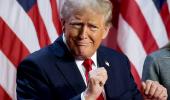
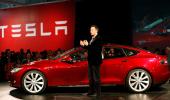
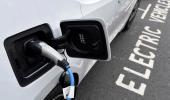
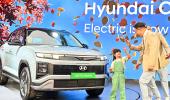
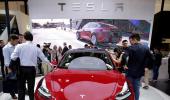






 © 2025
© 2025